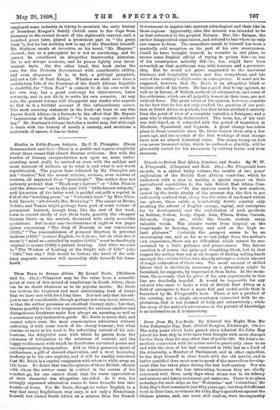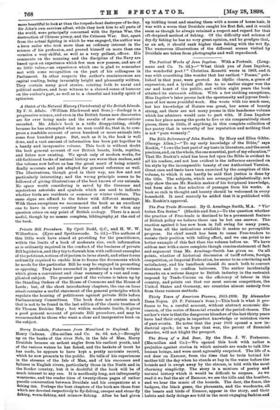Lines from Mit Log - Books. By Admiral the Right Hon. Sir
John Dalrymple Hay, Bart. (David Douglas, Edinburgh. 18s.)— The sixty years which have passed since Admiral Sir John Hay joined his first ship in 1834 have been fraught with more changes for the Navy than for any other line of public life. Sir John's im- mediate connection with its active service practically came to an end with the close of his last command in 1860, but as a Lord of the Admiralty, a Member of Parliament, and in other capacities, he has kept himself in close touch with the old service, and is better qualified than most men to speak of the marvellous develop- ment that has taken place during the last half-century. Nor are his reminiscences the less interesting because they are chiefly concerned with those early days when steam was in its infancy and armour and heavy armament yet unknown. There is no place nowadays for such ships as the 'Wolverine' and Columbine,' Sir John Hay's first commands just fifty years ago; but they did efficient work in their time, as witness Sir John Hay's operations against the Chinese pirates, and, one must still confess, wore incomparably more beautiful to look at than the torpedo-boat destroyer of to-day, Sir John's own services afloat, while they took him to all parts of the world, were principally concerned with the Syrian War, the destruction of Chinese piracy, and the Crimean War. But, apart from the actual fighting in which he was engaged, the author was a keen sailor who took more than an ordinary interest in the science of his profession, and proved himself on more than one occasion a very skilful, as well as a very gallant, officer. His comments on the manning and the discipline of the Navy are based upon an experience which few men now possess, and are of no little value,— an experience which one is glad to remember met with some recognition on the part of his colleagues in Parliament. In other respects the author's reminiscences are capital reading, being invariably bright and pleasantly written. They contain many good stories. relating bah to naval and political matters, and bear witness to a shrewd sense of humour on the author's part, as well as to a cheerful and kindly spirit of optimism.



































 Previous page
Previous page